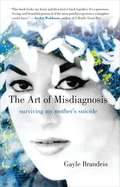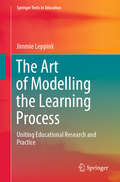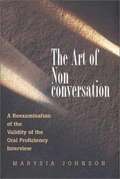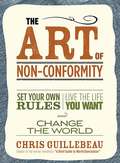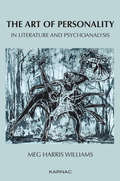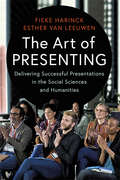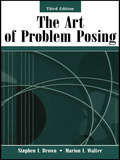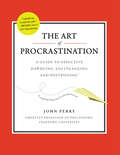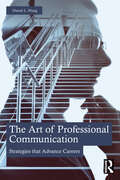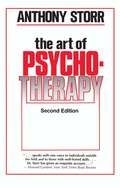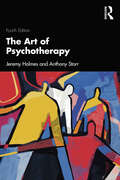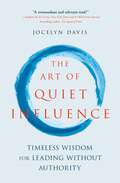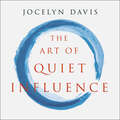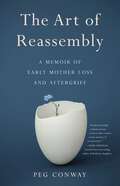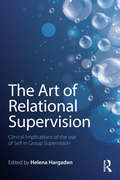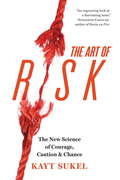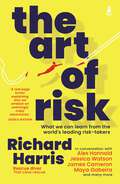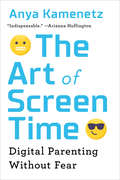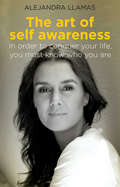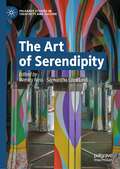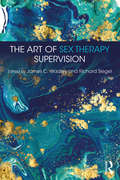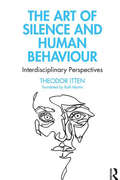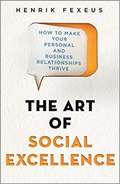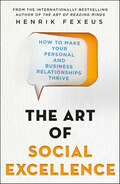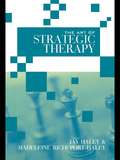- Table View
- List View
The Art of Misdiagnosis: Surviving My Mother's Suicide
by Gayle Brandeis<P>Award-winning novelist and poet Gayle Brandeis’s wrenching memoir of her complicated family history and her mother’s suicide. <P>Gayle Brandeis’s mother disappeared just after Gayle gave birth to her youngest child. Several days later, her body was found: she had hanged herself in the utility closet of a Pasadena parking garage. In this searing, formally inventive memoir, Gayle describes the dissonance between being a new mother, a sweet-smelling infant at her chest, and a grieving daughter trying to piece together what happened, who her mother was, and all she had and hadn’t understood about her. <P>Around the time of her suicide, Gayle’s mother had been working on a documentary about the rare illnesses she thought ravaged her family: porphyria and Ehlers-Danlos syndrome. <P> In The Art of Misdiagnosis, taking its title from her mother’s documentary, Gayle braids together her own narration of the charged weeks surrounding her mother’s suicide, transcripts of her mother’s documentary, research into delusional and factitious disorders, and Gayle’s own experience with misdiagnosis and illness (both fabricated and real). <P>Slowly and expertly, The Art of Misdiagnosis peels back the complicated layers of deception and complicity, of physical and mental illness in Gayle’s family, to show how she and her mother had misdiagnosed one another. <P>Gayle’s memoir is both a compelling search into the mystery of one’s own family and a life-affirming story of the relief discovered through breaking familial and personal silences. <P>Written by a gifted stylist, The Art of Misdiagnosis delves into the tangled mysteries of disease, mental illness, and suicide and comes out the other side with grace.
The Art of Modelling the Learning Process: Uniting Educational Research and Practice (Springer Texts in Education)
by Jimmie LeppinkBy uniting key concepts and methods from education, psychology, statistics, econometrics, medicine, language, and forensic science, this textbook provides an interdisciplinary methodological approach to study human learning processes longitudinally. This longitudinal approach can help to acquire a better understanding of learning processes, can inform both future learning and the revision of educational content and formats, and may help to foster self-regulated learning skills. The initial section of this textbook focuses on different types of research questions as well as practice-driven questions that may refer to groups or to individual learners. This is followed by a discussion of different types of outcome variables in educational research and practice, such as pass/fail and other dichotomies, multi-category nominal choices, ordered performance categories, and different types of quantifiable (i.e., interval or ratio level of measurement) variables. For each of these types of outcome variables, single-measurement and repeated-measurements scenarios are offered with clear examples. The book then introduces cross-sectional and longitudinal interdependence of learning-related variables through emerging network-analytic methods and in the final part the learned concepts are applied to different types of studies involving time series. The book concludes with some general guidelines to give direction to future (united) educational research and practice. This textbook is a must-have for all applied researchers, teachers and practitioners interested in (the teaching of) human learning, instructional design, assessment, life-long learning or applications of concepts and methods commonly encountered in fields such as econometrics, psychology, and sociology to educational research and practice.
The Art of Non-Conversation: A Re-examination of the Validity of the Oral Proficiency Interview
by Marysia JohnsonThe purpose of this book is to provide answers to two fundamental questions. The first is a practical one, and it represents the main focus of the book: Is the Oral Proficiency Interview a valid instrument for assessing language speaking proficiency? The second is a theoretical one: What is speaking ability? (that is, speaking ability that exists independently of testing instruments).
The Art of Non-conformity: Set Your Own Rules, Live the Life You Want, and Change the World
by Chris GuillebeauIf you've ever thought, 'There must be more to life than this,' The Art of Non-Conformity is for you. Based on Chris Guillebeau's popular online manifesto 'A Brief Guide to World Domination,' The Art of Non-Conformity defies common assumptions about life and work while arming you with the tools to live differently. You'll discover how to live on your own terms by exploring creative self-employment, radical goal-setting, contrarian travel, and embracing life as a constant adventure. Inspired and guided by Chris's own story and those of others who have pursued unconventional lives, you can devise your own plan for world domination-and make the world a better place at the same time.
The Art of Personality in Literature and Psychoanalysis
by Meg Harris WilliamsThe Art of Personality is a diverse selection of talks and papers on psychoanalysis and literature given by the author over the past ten years. They elaborate on the goal expressed by Milton as 'becoming a true poem': that is, seeing parallels between the gradual construction of the personality and the construction of a work of art, following an internal evolution on the lines of Bion's description of an 'endoskeletonous personality'. The works discussed range from classic Greek drama to Dostoevsky, Kafka, and Patrick White. The author's thoughts on our interaction with literature stand alongside those of Adrian Stokes and Richard Wollheim on understanding paintings. She brings together a broad knowledge of ancient and modern writings with a deep understanding of the creatively imaginative mind, illuminated by post-Kleinian psychoanalysis. This book will be a source of pleasure and inspiration both to general lovers of literature and to psychoanalytic workers who value the poetic aspects of their patients and their own forms of expression.'
The Art of Presenting: Delivering Successful Presentations in the Social Sciences and Humanities
by Fieke Harinck Esther van LeeuwenDelivering professional presentations of scientific work is an important part of an academic's life. Oral presentations are important not only because you present your scientific work, but also because you present yourself to potential hiring committees, grant committees, and collaborators. This book uses insights from the field of psychology, as well as from the theatre, to teach you how to make a lasting impression. It addresses core topics such as how to design presentation slides, how to practice, and how to deliver your presentation to a range of audiences. Useful exercises are provided to help you cope with presentation anxiety, make the most out of conferences, and adapt your presentation to various formats, audiences, and cultures. It is not easy to present with impact, but this book contains the guidance you need to master the art of presenting.
The Art of Problem Posing
by Stephen I. Brown Marion I. WalterThe new edition of this classic book describes and provides a myriad of examples of the relationships between problem posing and problem solving, and explores the educational potential of integrating these two activities in classrooms at all levels. The Art of Problem Posing, Third Edition encourages readers to shift their thinking about problem posing (such as where problems come from, what to do with them, and the like) from the "other" to themselves and offers a broader conception of what can be done with problems. Special features include: an exploration of the logical relationship between problem posing and problem solving; sketches, drawings, and diagrams that illustrate the schemes proposed; and a special section on writing in mathematics.In the updated third edition, the authors specifically:*address the role of problem posing in the NCTM Standards;*elaborate on the concept of student as author and critic;*include discussion of computer applications to illustrate the potential of technology to enhance problem posing in the classroom;*expand the section on diversity/multiculturalism; and*broaden discussion of writing as a classroom enterprise.This book offers present and future teachers at the middle school, secondary school, and higher education levels ideas to enrich their teaching and suggestions for how to incorporate problem posing into a standard mathematics curriculum.
The Art of Procrastination: A Guide to Effective Dawdling, Lollygagging and Postponing
by John PerryThis is not a book for Bill Gates. Or Hillary Clinton, or Steven Spielberg. Clearly they have no trouble getting stuff done. For the great majority of us, though, what a comfort to discover that we’re not wastrels and slackers, but doers . . . in our own way. It may sound counterintuitive, but according to philosopher John Perry, you can accomplish a lot by putting things off. He calls it “structured procrastination”:In 1995, while not working on some project I should have been working on, I began to feel rotten about myself. But then I noticed something. On the whole, I had a reputation as a person who got a lot done and made a reasonable contribution. . . . A paradox. Rather than getting to work on my important projects, I began to think about this conundrum. I realized thatI was what I call a structured procrastinator: a person who gets a lot done by not doing other things.Celebrating a nearly universal character flaw, The Art of Procrastination is a wise, charming, compulsively readable book—really, a tongue-in-cheek argument of ideas. Perry offers ingenious strategies, like the defensive to-do list (“1. Learn Chinese . . .”) and task triage. He discusses the double-edged relationship between the computer and procrastination—on the one hand, it allows the procrastinator to fire off a letter or paper at the last possible minute; on the other, it’s a dangerous time suck (Perry counters this by never surfing until he’s already hungry for lunch). Or what may be procrastination’s greatest gift: the chance to accomplish surprising, wonderful things by not sticking to a rigid schedule. For example, Perry wrote this book by avoiding the work he was supposed to be doing—grading papers and evaluating dissertation ideas. How lucky for us.
The Art of Professional Communication: Strategies that Advance Careers
by Daniel PlungGoing beyond the mechanics of professional communication, this book combines insights into the overlooked implicit demands of corporate communication challenges with the proven strategies and techniques that distinguish professionals as capable communicators and candidates for promotion.The practical strategies offered in this book represent professional communication principles filtered through the lens of the author’s 40-year career, that enabled him to rise from an initial assignment as a technical editor to positions of senior management directing large, diverse business and technical organizations. Here, he has collected into one resource the reasoned and disciplined decision-making processes, tools, and techniques essential to craft communications, precisely attuned to the explicit and implicit expectations of each assignment and supported by a structure and presentation logic that delivers a totally responsive and accurately targeted product. This is an essential guide for all levels of professionals who recognize the need to distinguish themselves within a highly competitive career environment.Business professionals and instructors in corporate training programs, supervisors and managers, and students in professional communication programs will welcome this deep dive into the real-world challenges and opportunities in professional communication and the role effective communication plays in career advancement.
The Art of Psychotherapy
by Anthony StorrAnthony Storr's accessible and humane account of the art of psychotherapy has been widely read by practitioners in training and others in the helping professions, as well as many general readers. The second edition includes a thoroughly revised account of the obsessional personality, and a new chapter that draws on the author's recent work on the importance of the processes of healing that take place within the isolated individual.
The Art of Psychotherapy
by Anthony Storr Jeremy HolmesStorr’s The Art of Psychotherapy first appeared in 1979 and became an instant classic. After Storr’s death, a third edition was rewritten and revised by Jeremy Holmes, and this fourth edition is a further up-to-date iteration. Storr (1920–2001) and Holmes, both medical psychoanalytic psychotherapists, are ‘elders’ in the world of psychotherapy. Their eclectic, experienced and cultured voices offer students and psychotherapy practitioners clinical wisdom hard to find elsewhere. Their book expounds in a very practical way the issues entailed in setting up and maintaining a psychotherapeutic relationship and practice: how to introduce oneself, arrange one’s consulting room, establish a contract, when and how to make ‘interpretations'. The second half of the book deals with more general and often problematic issues, including how to align therapy in the light of diagnosis, working with ‘difficult’ patients, therapy termination, and the life course of a therapist, ending with a valedictory overview. In this fourth edition, Holmes has added a chapter on the scientific validation of psychotherapy, sections on tele- and e-therapy, non-binary gender and sexual identities and the impact of race and class on the therapeutic relationship. This engaging, accessible and profound book is essential reading for psychotherapists, counsellors, psychiatrists and mental health practitioners in training or practice.
The Art of Quiet Influence: Timeless Wisdom for Leading Without Authority
by Jocelyn DavisInfluence is getting things done without coercion. It's strength without force-mindfulness in action. Master influencers walk lightly, talk softly and have no need of a big stick, yet collective success hinges on their words and deeds.Anyone can be a quiet influencer. Featuring twelve specific practices, twelve typical pitfalls and dozens of powerful stories and examples, The Art of Quiet Influence is a roadmap for the journey. Author Jocelyn Davis weaves together the timeless wisdom of Eastern thinkers-from Confucius to the Buddha, from Rumi to Gandhi-with research and insights from modern-day experts, revealing what's wrong with the Western view of influence as short-term persuasion and showing instead how to create trust-based collaborations with lasting impact.
The Art of Quiet Influence: Timeless Wisdom for Leading Without Authority
by Jocelyn DavisMindfulness meets execution . . . at work. The wisdom of 13 Eastern sages, augmented by modern research on workplace influence, is the basis for profound yet practical advice on getting things done without force.The Art of Quiet Influence shows anyone how to use influence, a key mindfulness principle, to get things done at work. Through the classic wisdom of 13 Eastern sages (especially the Buddha), relevant insights from influence research, and anecdotes and advice from 25 contemporary experts, Davis lays out a path for becoming a 'mainspring,' an unobtrusive yet powerful influencer.Organised around three core influence practices: Invite Participation, Share Power, and Aid Progress, readers will learn how to take mindfulness practice 'out of the gym and onto the field,' while gaining the confidence and practical know-how to be influential in whatever role they occupy.(P)2019 Hodder & Stoughton Limited
The Art of Reassembly: A Memoir of Early Mother Loss and Aftergrief
by Peg ConwayIf your mom is dead, is she still your mom? At twenty-five—nearly two decades after losing her mother to breast cancer as a little girl—an accident on a downtown street unleashes startling emotional reactions in Peg Conway, and this question starts to percolate. She comes to understand what she&’s experiencing as long-buried childhood grief, and as she marries and becomes a mother herself, Peg&’s intense feelings challenge her to offer herself compassion. Gradually she confronts how growing up surrounded by silence in a family that moved on from sorrow had caused her to suppress her mother&’s memory for far too long. Ultimately, after excavating all the layers, Peg finds her mom again, and in the process discovers that truth, no matter how painful, heals.
The Art of Relational Supervision: Clinical Implications of the Use of Self in Group Supervision
by Helena HargadenThe Art of Relational Supervision demonstrates the clinical implications of the relational approach when applied to supervision. Describing her philosophical and theoretical rationale for setting up relational supervision groups, Helena Hargaden’s goal in supervision is to reveal the relational unconscious within the client/therapist relationship. Here, with chapters from members of these groups, the vitality of supervision is brought to life as the clinical implications of the therapist's internal world are highlighted by group members. The complexity of group dynamics are explored and psychotherapists show how this positively affects their work with clients and patients. The main themes examined in the book are the: Bi-directionality of the relational unconscious Ubiquity of therapeutic enactments and ruptures Intuitive use of improvisation Co-creation of the intersubjective third – the analytic third Focus on mutuality and reciprocity Filled with case study examples, readers of The Art of Relational Supervision will gain a deep insight into the complex dynamics which form an integral part of any supervision and discover how, this type of relational approach strengthens the therapeutic relationship to bring about significant psychological change for the client. It will be an invaluable resource for psychotherapists, counsellors and psychologists.
The Art of Risk
by Kayt SukelAre risk-takers born or made? Why are some more willing to go out on a limb (so to speak) than others? How do we weigh the value of opportunities large or small that may have the potential to change the course of our lives? These are just a few of the questions that author Kayt Sukel tackles, applying the latest research in neuroscience and psychology to compelling real-world situations. Building on a portfolio of work that has appeared in such publications as Scientific American, Atlantic Monthly, The Washington Post, and more, Sukel offers an in-depth look at risk-taking and its role in the many facets of life that resonates on a personal level. Smart, progressive, and truly enlightening, The Art of Risk blends riveting case studies and hard-hitting science to explore risk-taking and how it impacts decision-making in work, play, love, and life, providing insight in understanding individual behavior and furthering personal success.From the Hardcover edition.
The Art of Risk
by Richard HarrisDiving doctor on the Thai Cave Rescue (now a Netflix series) and former joint Australian of the Year explores the stories of other people who regularly risk their lives and what we can learn from their expertise. Are free-solo climbers, underwater cave explorers and big-wave surfers crazy ... or cautious? How do soldiers and fighter pilots manage risk? What can we learn from how BASE jumpers and drag racers prepare that we can take into our own lives? &‘Harry&’ Harris – Thai Cave Rescuer, joint Australian of the Year – has an unusual idea of fun: he crawls though pitch-black, confined caves, deep underground and usually underwater. To most, that&’s a nightmare. To him, it&’s recreation. He&’s prepared for all conceivable risks, he&’s completely focused. And the discipline and danger involved leave him better prepared for everyday life. In this ultimate armchair adventure, Harry takes us into the lives of other &‘risk-takers&’, to find out why they do what they do. We meet people adventuring from the highest skies to the deepest oceans – BASE jumpers, drag racers, snipers and surfers – including climber Alex Honnold (from the movie Free Solo), sailor Jessica Watson, film director and deep-sea diver James Cameron. Each gripping story is a masterclass in risk from the experts: when to go, when to say no, how to prepare and above all, how pushing ourselves a little further helps us become more courageous and resilient in all of our challenges.Heart-pounding and eye-opening, you&’ll never look at risk the same way again. &‘Richard &“Harry&” Harris peels back the mindset that shapes the line between recklessness and courage.&’ Hugh Riminton
The Art of Screen Time: How Your Family Can Balance Digital Media and Real Life
by Anya Kamenetz<P>Finally, an evidence-based, don't-panic guide to what to do about kids and screens. <P>Today's babies often make their debut on social media with the very first sonogram. They begin interacting with screens at around four months old. But is this good news or bad news? A wonderful opportunity to connect around the world? Or the first step in creating a generation of addled screen zombies? <P>Many have been quick to declare this the dawn of a neurological and emotional crisis, but solid science on the subject is surprisingly hard to come by. In The Art of Screen Time, Anya Kamenetz--an expert on education and technology, as well as a mother of two young children--takes a refreshingly practical look at the subject. Surveying hundreds of fellow parents on their practices and ideas, and cutting through a thicket of inconclusive studies and overblown claims, she hones a simple message, a riff on Michael Pollan's well-known "food rules": Enjoy Screens. Not too much. Mostly with others. <P>This brief but powerful dictum forms the backbone of a philosophy that will help parents moderate technology in their children's lives, curb their own anxiety, and create room for a happy, healthy family life with and without screens.
The Art of Self Awareness
by Alejandra LlamasIf you're ready to break repetitive patterns, if you want to have a rich, deep and authentic life experience, this book is for you. The book you have in your hands is the way to understand who you really are and the wide spectrum of possibilities that await in your life story.Enter into a deeper dimension regarding your great purpose as an individual and as part of humanity. Based on ontological coaching and the teachings of ancestral wisdom, this book will lead you to understand that truly, everything is possible."There are books that change lives and this is one of them. Alejandra Llamas has that surprising capacity to find what is important in life and, furthermore, knows how to communicate it. Her message, and the way that she expresses it on radio and television, is simply vital. But, to be honest, you have to start by reading her."Jorge Ramos, journalist and author."Coaching freed me from concepts that trapped my mind and soul. Thanks to personal coaching, I redirected my energy towards the right road, the road that makes you better and happier. To have been led by Alejandra Llamas is the best thing that ever happened to me."Gloria Calzada
The Art of Serendipity (Palgrave Studies in Creativity and Culture)
by Samantha Copeland Wendy RossSerendipity and creativity are both broad, widely disputed, and yet consistently popular concepts which are relevant to understanding the positive aspects of our daily lives and even human progress in the arts and sciences. The chapters in this book reflects a variety of theoretical and practical approaches to serendipity in various domains, including creative problem solving, sculpture, writing, theatre and design. Chapter authors address issues such as the nature of the ‘prepared mind’, the role of accidents, serendipity as a skill or way of engaging with the world and, indeed, how serendipity works as a concept and practice in relation to the dynamic flow of the creative system. Those who wish to explore the nature of chance in art and creativity, as well as in their daily lives, will find much to ponder in these pages.
The Art of Sex Therapy Supervision
by James C. Wadley Richard SiegelThe Art of Sex Therapy Supervision is a collection of scholarly writings and case narratives that sheds light on issues that sex therapists face as supervisors or supervisees and provides techniques that can be adapted to fit clients' specific needs. Written by experts in a range of fields, this book covers a wide range of perspectives and methodologies for assisting diverse populations, including conservative Christians, LGBTQ clients, and those who exhibit out-of-control sexual behavior. It addresses individual, relational, and systemic engagement in the context of sexual function/dysfunction, and it also discusses obstructions clinicians can face when providing critical feedback to clients. This book will be useful for aspiring supervisors as well as those who supervise clinicians seeking licensure or certification.
The Art of Silence and Human Behaviour: Interdisciplinary Perspectives
by Theodor IttenThis book examines the phenomenon of silence in relation to human behaviour from multiple perspectives, drawing on psychological and cultural-philosophical ideas to create new, surprising connections between silence, quiet and rest. Silence and being quiet are present in everyday life and in politics, but why do we talk about it so rarely? Silence can be cathartic and peaceful, but equally oppressive and unbearable. In the form of communication, we keep secrets to protect ourselves and others, but on the other hand subjects can be silenced with dictatorial posturing - a communicative display of power – and something can be literally ‘hushed up’ that needs to be disclosed. In unique and engaging style, Theodor Itten explores the multi-layered internal conversation on silence in relation to the self and emotions, demonstrating why it is sometimes necessary in our modern society. Describing and analyzing human behaviour in relation to silence, the book also draws on psychoanalytic ideas by outlining the power of silence in processing our emotions and relationships and hiding innermost feelings. With rich narrative signposts providing thought-provoking and amusing insights, and interpersonal communication examined in relation to everyday life, this is fascinating reading for students and academics in psychology, philosophy, cultural studies, and related areas.
The Art of Social Excellence: How to Make Your Personal and Business Relationships Thrive
by Henrik FexeusHenrik Fexeus uses his expert psychology knowledge to teach the reader how to hone their social skills, perfect for fans of Dale Carnegie.Research has increasingly shown that nonverbal communication prowess is absolutely essential in seemingly unrelated areas of our lives (investment decisions, salary levels, etc.). However, as our society becomes more modernised and we incorporate new forms of technology into our daily interactions, we are becoming less and less capable of understanding one another as we should.In The Art of Social Excellence, Henrik Fexeus combines his own expert knowledge as a mentalist with psychology studies to create a complete guide to social interaction. He covers it all: from overcoming your conversational fears in a large group of people, to excelling in the workplace, to winning an argument with your partner. He breaks down various rhetorical strategies in detail and provides helpful steps and checklists for the reader to check their progress in a social encounter.Anyone who has ever felt awkward or misunderstood in social situations will benefit from reading this book, and with proper implementation of Fexeus' principles, can achieve superior social skills.
The Art of Social Excellence: How to Make Your Personal and Business Relationships Thrive
by Henrik FexeusIn this follow-up to The Art of Reading Minds, Henrik Fexeus uses his expert psychology knowledge to teach the reader how to hone their social skills, perfect for fans of Dale Carnegie.Research has increasingly shown that nonverbal communication prowess is absolutely essential in seemingly unrelated areas of our lives (investment decisions, salary levels, etc.) However, as our society becomes more modernized and we incorporate new forms of technology into our daily interactions, we are becoming less and less capable of understanding one another as we should. In The Art of Social Excellence, Henrik Fexeus combines his own expert knowledge as a mentalist with psychology studies to create a complete guide to social interaction. He covers it all: from overcoming your conversational fears in a large group of people, to excelling in the workplace, to winning an argument with your partner. He breaks down various rhetorical strategies in detail, and provides helpful steps and checklists for the reader to check their progress in a social encounter. Anyone who has ever felt awkward or misunderstood in social situations will benefit from reading this book, and with proper implementation of Fexeus's principles, can achieve superior social skills.
The Art of Strategic Therapy
by Jay Haley Madeleine Richeport-HaleyExperience the art of Jay Haley's strategic therapy as he personally utilizes a variety of techniques in treating depression, violence, and psychosis with couples, children, families and various ethnic groups.Visit www.haley-therapies.com for additional resources by Jay Haley, including live videos of the pioneering therapist in action.
